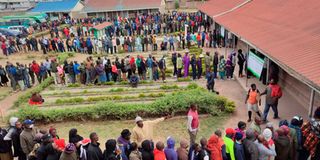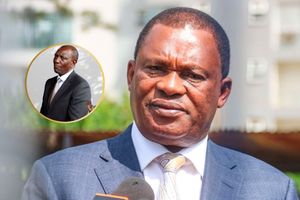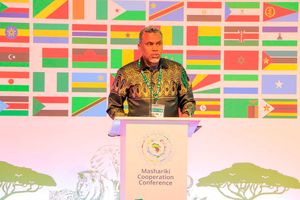
Kenyan voters wait in line to cast their ballots on August 9, 2022.
Democracy comes from the Greek words “demos”, meaning the people and “kratos” meaning to rule. So, a simple definition of it is, rule by the people.
Some of the commonly understood essential elements of democracy include respect for human rights, the rule of law, competitive periodic elections, separation of powers, independent, free and pluralistic media, pluralistic political party systems and principles of transparency and accountability.
There is a shared understanding of the key elements of democracy. A 2024 study published in the journal Science found that people across the world considered two attributes to be the key determinants of a democracy: protection of civil liberties and free and fair elections. It had surveyed people from diverse countries as Egypt, Italy, India, Japan, Thailand and the United States.
The Varieties of Democracy (V-Dem) Institute in Gothenburg released its ninth annual review of democracy last month. The 2025 Democracy Report: “25 Years of Autocratisation - Democracy Trumped?” echoes a lot of the well-known concerns about the present state of democracy across the world. It is a sobering and humbling affirmation.
The quality of democracy in democracies is in decline, as authoritarianism in autocracies deepens. The report emanates from an innovative, diverse experts-based judgement drawing from conceptual and case knowledge. It focuses on the liberal and electoral dimensions of democracy. Therefore, the assessment zeroes in on the quality of elections, state of civil liberties and the rule of law and the extent of separation of powers between arms of government (the executive, legislature and judiciary).
More autocracies
Essentially, the verdict is that democracy is in decline, as a downward spiral continues. Alluding to a global wave of autocratisation, the report notes that, in liberal and electoral terms, for the first time in more than 20 years, the world has more autocracies (91 countries) than democracies (88 countries). Three out of four persons in the world now live in an autocracy, the highest level since 1978. For the average citizen, the level of democracy is back to its mid 80’s level. Evidently, democracy is also weakening in hitherto well-established liberal democracies, even as autocracy deepens in others.
That autocracy is deepening in larger, more powerful countries and economies is significant due to their influence over smaller countries. That catalytic effect can only be damaging to multilateral cooperation and other aspects like universal norms and standards around human rights and the rule of law.
Key elements of democracy registering a worsening trend include an alarming loss in freedom of expression as is the case in 44 countries, up from 35 countries in the previous year of review. There is a decline in the rule of law, freedom of association and free/fair elections.
Undermining of elections
Tellingly, media censorship, undermining of elections and weakening of civil society are the top choice weapons applied by autocrats. Notably, in 2024, freedom of expression has deteriorated in 44 countries, as contrasted with only 7 countries, twenty years earlier in 2004. Respectful, facts-based debate, a key tenet of democracy is seen to have deteriorated in 27 countries, another worrying - worsening trend. A decline in clean elections is seen in 25 countries (compared to 11 countries a decade ago in 2014). This measure refers to free and fair elections devoid of systematic irregularities, registration fraud, state intimidation of opponents and electoral violence.
Most countries are experiencing heightened government efforts at media censorship over the past decade. The report states that “in 44 countries, governments have substantially and statistically significantly increased their efforts at censoring the media over the past ten years”. The worst offending countries include Afghanistan, India and Myanmar. A related concern is increased harassment of journalists, media self censorship (especially on politically sensitive reporting) and media bias (in favour of incumbents). This is relatable in many contexts.
By regime type, the report classifies Kenya as a “grey zone” electoral democracy alongside countries like Nigeria, Mexico, Albania and Zambia. This category is reserved for regimes close to the threshold between democracy and autocracy. It refers to countries deemed to be electoral democracies but are likely behind the bar for democracy. Botswana, Ghana, Malawi and Senegal are some of the African countries classified as electoral democracies, whereas Algeria, Burundi, Ethiopia, Mozambique, Rwanda, Tanzania and Uganda are considered electoral autocracies. In the closed autocracies camp are Burkina Faso, Eritrea, Libya, Mali and both Sudans.
Interestingly, from Africa, only Seychelles and South Africa find themselves labeled as liberal democracies. South Africa is considered to have ‘regained it’s liberal democracy status in 2024’ after falling in the electoral democracy category for the past decade. The review notes the Seychelles to have began its democratization process in 2012 as an electoral autocracy and transitioning to a point where the first peaceful transfer of power to the opposition (since independence in 1976) took place in 2020.
Democracy
In terms of populous countries, India, previously dubbed one of the world’s largest democracies, falls in the electoral autocracy band since 2017, given what the report describes as an ‘episode of autocratization’. The review names the systematic dismantling of democratic institutions, deterioration in freedoms of expression and media independence as some of the hallmarks of the derailment of democracy in India under “the anti-pluralist, Hindu nationalist Bharatiya Jayati Party (BJP)”. Per the report, the June 2024 election, which yielded a setback to the BJP, forcing it to govern via a coalition, marks the first time since 2008 without a deterioration in levels of democracy in that country. Brazil is placed in the opposite category as an electoral democracy, while China is considered a closed autocracy.
46 per cent of the world’s population lives in electoral autocracies. In sub-Saharan Africa, the report asserts that 64 per cent of people reside in autocracies, with electoral autocracies accounting for 49 per cent of the continent’s population. In contrast, 64 per cent of the population in Latin America and the Caribbean is considered to live in electoral democracies. Cuba and Haiti are classified as closed autocracies.
This report confirms most people’s hunch that the last few years have been exceptionally bad for democracy, the most practiced form of governance. Rising polarisation and disinformation continue to fuel autocratisation, further threatening democracy.
Atieno Ndomo is a Social Policy Analyst with a keen interest in political economy.










